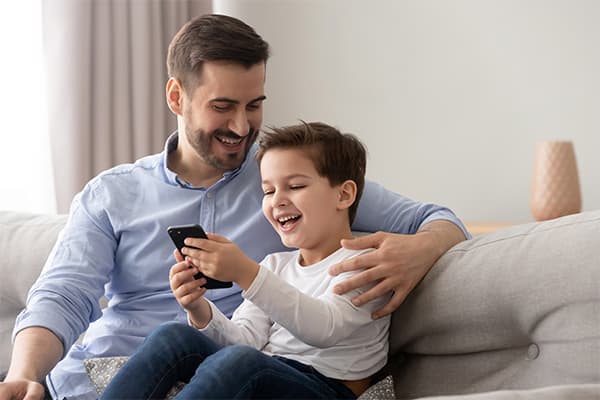How to Guide your Kids Safely in the Digital World?
Aditi Patel
Top 10 Best Parental Control Apps Editor
Parental control apps have become indispensable tools for modern parents navigating the digital landscape alongside their children. In an era where children are increasingly exposed to the internet from a young age, these applications offer a proactive approach to ensuring their safety and well-being online. By allowing parents to monitor and manage their child’s digital activities, parental control apps provide peace of mind while empowering parents to guide their children’s online experiences responsibly. With features ranging from content filtering to screen time management, these apps offer a comprehensive solution to help parents navigate the complexities of raising digitally savvy children. Here are pointers to help you guide your child safely in the digital world, thus giving them the responsibility to choose the right content for themselves.

Using a parent control app should be a mutual decision
Depending solely on an app to control your child’s online activity might give a false sense of security. Kids are adept at bypassing such restrictions by creating new accounts. However, discussing the app’s importance with your child and reaching a mutual agreement on its usage can be beneficial. Experts recommend having regular, open conversations with children, emphasizing compassion and empathy over fear and frustration. This approach encourages better online decision-making, whether you’re actively monitoring them or not.
Educate your child on How to use their computer/ tablet/ phone
The primary goal is to instill responsible usage habits, teaching them to navigate digital resources with integrity. Remember, imparting online etiquette akin to real-life social conduct is essential.
Initiate discussions about device usage by establishing clear guidelines. Emphasize to your children that while they may have access to the device, you, as the parent, retain ownership and may occasionally check its usage. It’s advisable to hold the passwords to your children’s devices and online accounts, assuring them it will only be accessed if necessary.
Create a friendly environment for free and open discussions
After setting up general guidelines, a parental control app can act as an additional layer of reinforcement. However, it’s essential to acknowledge that digital tools aren’t infallible, and issues like glitches or gaps may arise. If your child encounters inappropriate content despite the controls, ensure they know they can approach you with any questions or worries. While discussing such matters with your children may be challenging, it’s crucial for their safety and understanding of online boundaries. These conversations, albeit difficult, play a vital role in fostering a healthy digital environment for your family.
The No Phone rule for all
It’s essential to lead by example when establishing rules around phone usage within the family. If you’ve implemented a guideline that prohibits cell phone use during dinner or family outings, it’s crucial to adhere to it yourself. Children, especially younger ones, learn from observing their parents’ behavior. If they see you frequently texting or taking calls during family time, they may internalize this behavior as acceptable. However, if there’s a legitimate reason for using your phone, be transparent about it. Teaching children about the intentional and limited use of screens is key, emphasizing that there’s a time and place for them, rather than constant access.
Maintaining a balance and not crossing the line
Parental control apps bear similarities to spyware, software designed to covertly monitor someone’s phone or computer activities without their awareness. Both types of apps can track location, use keyloggers to capture typed content, and record phone calls. However, the crucial distinction lies in their intent.
Spying on adults without consent is unethical and often illegal, as recording conversations remotely typically requires consent from all parties involved. In contrast, parental monitoring aims to promote child safety and limit exposure to inappropriate online content, falling within the realm of parental rights and responsibilities.
While certain parental control apps offer the ability to secretly install them on your child’s phone, it’s not advisable to do so. Such actions can undermine the trust between you and your children, which is vital for open communication within the family. While your intention may be to ensure their safety online, it’s crucial to foster an environment where they feel comfortable discussing any concerns they have about their online activities. Secret monitoring may lead to a breach of trust if discovered, prompting your children to resort to evasive measures such as using burner phones, creating alternate accounts, or borrowing friends’ devices.
As parents, finding the right balance between monitoring and giving space is crucial. Experts’ caution that insufficient interest in your child’s online activities may make them feel neglected, prompting them to seek validation elsewhere. Conversely, excessive control may lead to feelings of resentment and compel them to hide their online behaviors. When teenagers become adept at concealing their online presence, they’re less likely to confide in you during challenging situations. Thus, striking a balance ensures a healthy relationship where they feel comfortable discussing their concerns openly.
Respect their Privacy
Privacy is a crucial aspect, especially for older teenagers transitioning into adulthood. Unless there are significant concerns, consider easing up on the monitoring. Occasional check-ins may suffice, allowing them to learn to set their own boundaries. When using a monitoring app, clarify its purpose—to monitor, not invade privacy. Assure them that you won’t scrutinize every online activity but reserve the right for occasional checks. Adolescents require private spaces for peer interactions, often online nowadays, fostering their autonomy. Allowing some independence in their online engagements could contribute positively to their development.







